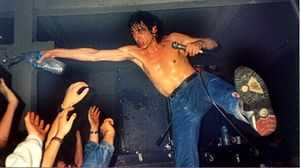La Polla Records
| La Polla Records | |
|---|---|
|
Evaristo performing in a concert | |
| Background information | |
| Also known as | La Polla |
| Origin |
Salvatierra, |
| Genres | Punk rock, hardcore punk |
| Years active | 1979–2003 |
| Labels |
Oihuka Gor Discos Maldito |
| Website |
www |
| Past members |
Evaristo Abel Fernandito (deceased) Txarly Sume Maleguin Tripi Jokin Txiki |
La Polla Records was a Basque Spanish punk rock band. They were formed in 1979 in Salvatierra/Agurain, a small town in the Basque Country (Spain). Its founders were Evaristo Páramos on vocals, Maleguin on bass, Fernandito on drums and Txarly and Sumé on guitars. The name was somewhat controversial because in Spanish, "polla" is vulgarly slang for "cock, penis". The lyrics of the band harshly criticized fascism, militarism, capitalism, and catholicism.
Background
In 1981, the band performed and recorded their first demo called Banco Vaticano, never released officially.
In 1983, recorded their first EP under the indie label Oihuka called ¿Y ahora qué? ("So now what?"). It had four songs. In 1984, La Polla Records released the first studio album: Salve.
The following years they recorded Revolución (1985), in this album Abel Murua replaced Maleguin on the bass. They later released more albums: No somos nada (1987), Donde se habla (1988) and En directo (recorded live) as well as Ellos dicen mierda, nosotros amén ("They say shit, we say Amen") in 1990, Los jubilados (1990), the second EP Barman (1991), Negro (1992) and Hoy es el futuro in 1993.
In 1994, due to some issues with a former band member since 1991, a tribunal forbade their use of the name La Polla Records. The band ignored the sentence and released Bajo presión under the forbidden name. In 1996, however, they changed their name and simply became La Polla. Under this new name they released Carne para la picadora.
La Polla en tu recto, the second live album was released in 1998. In 1999 they celebrated their 20th anniversary recording Toda la puta vida igual. Shortly after, Txarly left the band in January 2000, replaced by Jokin, former member of another Spanish punk band, M.C.D.. Then recorded and released Bocas in 2001.
Separation
In 2002 La Polla were still actively playing when, quite suddenly, Fernandito died of a heart attack on September 3. The band cancelled the remaining concerts of the tour. After the loss of their drummer they released their last album: El último (el) de la Polla (literally, "La Polla's last").
La Polla Records was a band that was known as a symbol of rebellion against everything, to the point of them being called "anti-everything". As a result of this they faced several major obstacles throughout their career, primarily threats and repression. The band members even faced jail time during a fiasco with Eskorbuto, another Basque band.
After La Polla Records split, Evaristo Páramos (vocals) released a book named "Por los Hijos lo que sea" where he told stories and anecdotes that told many of the same messages as his songs. Evaristo continued his musical career with bands such as The Kagas, The Meas and Gatillazo.
Legacy
La Polla Records were one of the first punk bands to sing in Spanish. They, along with dozens of other bands were part of an underground movement that existed throughout the 1980s in Spain, particularly in the Basque Country, quite distinct from the rising bands in Madrid. While the latter put an accent on innovative aesthetics and manners, the Basque brand of alternative rock showed in-your-face stage attitude and no holds barred in lyrics, including blunt social and political views. It came as a reaction first to the end of Francisco Franco's dictatorship in Spain (1975), and then as an outlet to vent frustration at the limitations of the democratic transition. The brand of DIY rock music developing in the Basque Country during this period came to be known as "Rock Radical Vasco" (Basque Radical Rock). La Polla Records would share this stage with many other influential bands from the Basque Country like Eskorbuto, Kortatu, Barricada, and many others. The ska-punk band Ska-P cites La Polla Records as one of their primary influences.
Members
- Core members
- Evaristo "El Flipas" Páramos - Vocals (1979–2003).
- Manolo "Sumé" García - Rhythm guitar, backing vocals (1979–2003).
- Miguel "Txarly" Garín - Lead guitar, backing vocals (1979–2000).
- Fernando "Fernandito" Murua - Drums (1979–2002).
- Abel Murua - Bass guitar (1985–2003).
- Other members
- Teodoro "Maleguin" Saez de Zerain - Bass guitar (1979–1985).
- Joaquín "Jokin" González Herbella - Lead guitar (2000–2002).
- "Tripi" - Drums (2002–2003)
- "Txiki" - Lead guitar (2002–2003).
Discography
- Studio Albums
- Banco Vaticano (Demo) - 1981
- Salve - 1984
- Revolución - 1985
- No somos nada - 1987
- Donde se habla - 1988
- Ellos dicen mierda, nosotros amén - 1990
- Los jubilados - 1990
- Negro - 1992
- Hoy es el futuro - 1993
- Bajo presión - 1994
- Carne para la picadora - 1996
- Toda la puta vida igual - 1999
- Bocas - 2001
- El último (el) de La Polla - 2003
- Extended Plays
- Y ahora qué? - 1983
- Barman - 1991
- Live Albums
- En directo - 1988
- En tu recto - 1998
- Vamos entrando - 2004
- Compilations
- Volumen 1
- Volumen 2
- Volumen 3
- Volumen 4
- 14 años de La Polla - 1996
External links
- www.lapollarecords.net Official Web Site
- www.lapollarecordsweb.com.ar - Unofficial site
- www.lapollarecords.org - Unofficial site
- Official site of Gatillazo, Evaristo's new band
- La Polla Al Corte, live in Barcelona, Zeleste, year 2000 videoclip HQ (Vimeo)
